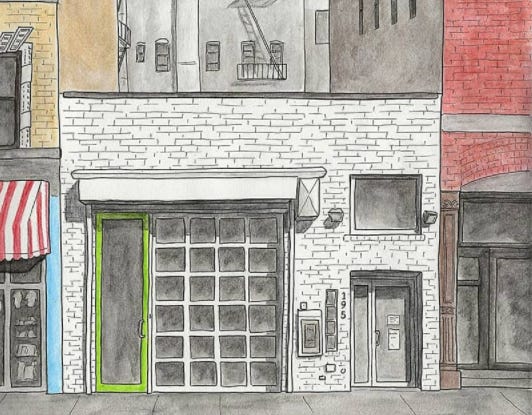Off-Off-Broadway’s Wild Project Won’t Go Down Without a Fight
GoFundMe campaign follows a year of wide-ranging digital work

Digital programming is not paying Wild Project’s rent. But for Ana Mari de Quesada, producing artistic director of Wild Project, letting her theater go entirely dark was just never an option.
“I don’t want to be another statistic,” she said. “I’m going to go down fighting.”
When the pandemic forced Wild Project to close its doors one year ago, the 89-seat off-off-Broadway East Village venue—best known for hosting Clubbed Thumb’s annual Summerworks festival—was going strong as a home for exciting new work.
Heidi Schreck’s runaway hit What the Constitution To Me premiered at Summerworks in 2017, before transferring to New York Theatre Workshop and then Broadway. Wild Project has also been home to the Poetic License Festival, Dutch Kills Theater, Loading Dock Theatre, Fresh Fruit Festival and the East Village Queer Film Festival, to name just a few, since its 2007 opening.
Small independent venues have been hit especially hard by the shutdown. In January, Quesada launched a GoFundMe campaign, “Save the Wild Project,” with a $50,000 goal.
“Creativity begins here,” actress Estelle Parsons explained in a speech recently posted as part of the campaign. “You throw a pebble in the water, and all these rings go out. It goes from the Lower East Side, to the West Village, and then uptown, then all over the country — and then it comes right back to here.”
As the clip was shared, Parsons donated $1,000 to Wild Project’s campaign. “I put my money where my mouth is,” she wrote.
Rent is the main challenge for Quesada as she works to keep the East 3rd Street space afloat through the pandemic.
“The only reason we’re still open is because our landlord has been working with us,” she said.
Wild Project received a PPP loan last spring. After that money ran out, a small venue grant from the Indie Theater Fund—a support and advocacy group self-funded and run by independent theaters—helped cover rent from August through December.
A lifeline is coming in the Save Our Stages Act, passed by Congress as part of the December Covid relief bill. But venues are still waiting for the Small Business Administration to open applications for the act’s $15 billion fund for shuttered venues. The SBA says it expects to start taking applications in April.
Quesada launched the GoFundMe to “bridge the gap” and get Wild Project through the summer, hoping to receive a grant—though she notes there is no guarantee of winning support even once applications do open.
In the meantime, Wild Project is far from inactive. Streaming platform “wildprojectTV” hosts an array of works filmed at the theater with no audience, from stand-up comedy to movement pieces. Queer composer Mur filmed their musical Trees in the space, creatively using each corner and crevice to “create a void, a space with no end,” as they put it.
After Dutch Kills’ production of The Antelope Party shut down on its first day of tech rehearsals in the space last March, the company pivoted to Temping, an experiential show for one audience member with no actors staged in Wild Project’s gallery.
“Because of Ana Mari, we were able to give a live theatrical experience to 154 audience members during this pandemic,” said Alley Scott, artistic director at Dutch Kills, crediting both the theater’s flexibility in its layout and meticulous safety procedures. “Her warmth and determination to save small theater in NYC was a huge asset to us—and to the community at large.”
In seeking a home for his filmed production of Happy Days, director Nico Krell hit up against a landscape of varying streaming models and few small spaces that could accommodate work they didn’t program. He credits Wild Project for providing small projects and up-and-coming artists with a home.
“Wild Project was the one saying: We are safely making work,” said Krell. “Part of the appeal was knowing they have acted as an incubator for young artists, as a place to get comfortable and explore. [They will] do what needs to be done for the show, rather than what needs to be done for the theater.”
Right as Krell’s team was filming Happy Days (now extended through March 28th), the theater launched its fundraising campaign.
“There did become this real sense of being on the frontline of a crumbling theatrical infrastructure,” he recalled. “One of the responsibilities of working on a show during quarantine is to support these pleas from a ship that’s trying to stay afloat.”
While the fundraiser is far from reaching its goal, the outpouring of support has been gratifying for Quesada. The ripples that had spread far and wide were indeed circling back home.
“[A donation will] come with an amazing note from the artist saying: ‘You’ve been there for me over the years,’” or “You helped me create this show 10 years ago,’” said Quesada. “It just helps drive home the fact that what we’ve been wanting to do, what our mission has been, is actually happening.”
She is not re-opening to audiences yet—“I don’t feel safe yet to have a performer unmasked on stage”—but Wild Project’s filmed work continues, along with plans for outdoor performance as part of New York’s Open Culture program.
Quesada figures that since she’s already made it year, she isn’t about to stop now.
“If hypothetically things didn’t work out and we did have to close, we went out with a bang,” she said. “We didn’t just shutter our doors and wait, and pray. We continued to do quality work.”






